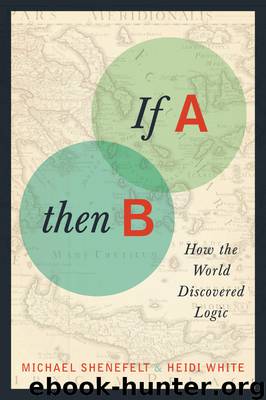If A, Then B by Michael Shenefelt & Heidi White

Author:Michael Shenefelt & Heidi White [Shenefelt, Michael]
Language: eng
Format: epub
Tags: PHI011000 PHILOSOPHY / Logic
Publisher: Columbia University Press
Published: 2013-05-09T16:00:00+00:00
THE APPARENT IRREDUCIBILITY OF INDUCTION
Here’s why: The trouble is that our new, revised argument isn’t deductively valid in the first place unless we also make a similar adjustment to its conclusion. The principle in brackets, the tacit one, now holds only on the condition, “everything else being equal.” Yet, in that case, our conclusion will also hold only on condition (“everything else being equal”). So our new conclusion will have to read, “Everything else being equal, the sun will probably rise tomorrow.” Yet this surely is not what reasonable people conclude about sunrises. On the contrary, on normal occasions, we don’t merely suppose the sun will probably rise everything else being equal; we suppose it will probably rise even though we know many other things won’t be equal. (The earth tomorrow will be substantially different from the earth today, yet we still infer that a sunrise will occur.) The tacit premise is now true, but the conclusion of the argument is far too weak.
In all these speculations about how our minds actually work, we seem to be involved, perhaps, in a fundamental mistake: we have begun to expect things from our analysis of induction that, perhaps, we shouldn’t expect at all. Specifically, we have tried to treat the two methods of deduction and induction as basically alike in that induction is simply a disguised form of deduction. The only difference is that induction assumes a further, tacit premise, a premise that turns an inductive argument into a deductive one. Yet we ought to know from the start that, if described correctly, the two methods of induction and deduction should give different results.
We ought to know that repetitions only sometimes show an inductive conclusion to be probable. Not everything repeated in the past is likely to be repeated in the future. (This is what we see in the case of the tennis ball.) On the other hand, we should also know that, when it comes to valid deduction, the premises always guarantee the conclusion. Once the premises are established, the conclusion is proved true invariably; this is part of proving the conclusion necessarily. (More exactly, logical necessity is a matter of form; arguments are deductively valid only because they embody certain patterns or schemas. But the whole point of talking about forms, patterns, or schemas is to describe all cases of a certain type; the very idea of logical necessity carries with it some sense of universality, even if the universality in question can’t always be defined with precision.) And the key point is that “sometimes” is different from “always.” A conclusion that is only sometimes reasonable can never be always reasonable. Consequently, any attempt to reduce the one sort of argument to the other—to reduce induction to deduction—would seem to be mistaken; every such attempt will replace an inference that is only sometimes reasonable with an inference that is always so. And in that event, we will have lost sight of what being reasonable truly is.
(More generally, no assumption about
Download
This site does not store any files on its server. We only index and link to content provided by other sites. Please contact the content providers to delete copyright contents if any and email us, we'll remove relevant links or contents immediately.
The remains of the day by Kazuo Ishiguro(9000)
Tools of Titans by Timothy Ferriss(8396)
Giovanni's Room by James Baldwin(7346)
The Black Swan by Nassim Nicholas Taleb(7130)
Inner Engineering: A Yogi's Guide to Joy by Sadhguru(6796)
The Way of Zen by Alan W. Watts(6614)
The Power of Now: A Guide to Spiritual Enlightenment by Eckhart Tolle(5784)
Asking the Right Questions: A Guide to Critical Thinking by M. Neil Browne & Stuart M. Keeley(5775)
The Six Wives Of Henry VIII (WOMEN IN HISTORY) by Fraser Antonia(5515)
Astrophysics for People in a Hurry by Neil DeGrasse Tyson(5190)
Housekeeping by Marilynne Robinson(4449)
12 Rules for Life by Jordan B. Peterson(4305)
Ikigai by Héctor García & Francesc Miralles(4275)
Double Down (Diary of a Wimpy Kid Book 11) by Jeff Kinney(4273)
The Ethical Slut by Janet W. Hardy(4256)
Skin in the Game by Nassim Nicholas Taleb(4250)
The Art of Happiness by The Dalai Lama(4130)
Skin in the Game: Hidden Asymmetries in Daily Life by Nassim Nicholas Taleb(4007)
Walking by Henry David Thoreau(3963)
